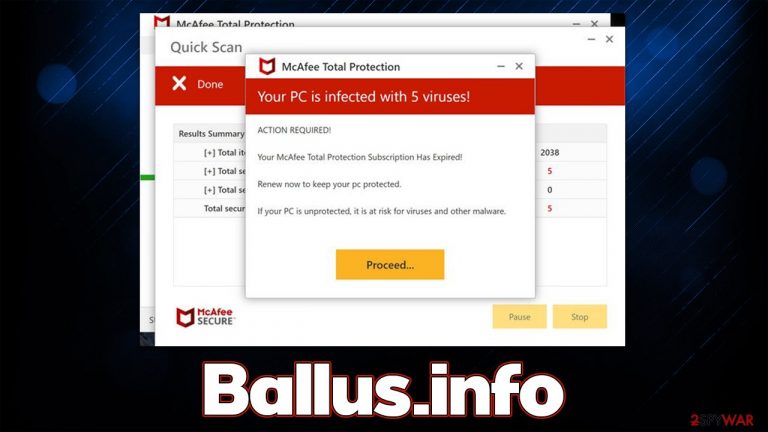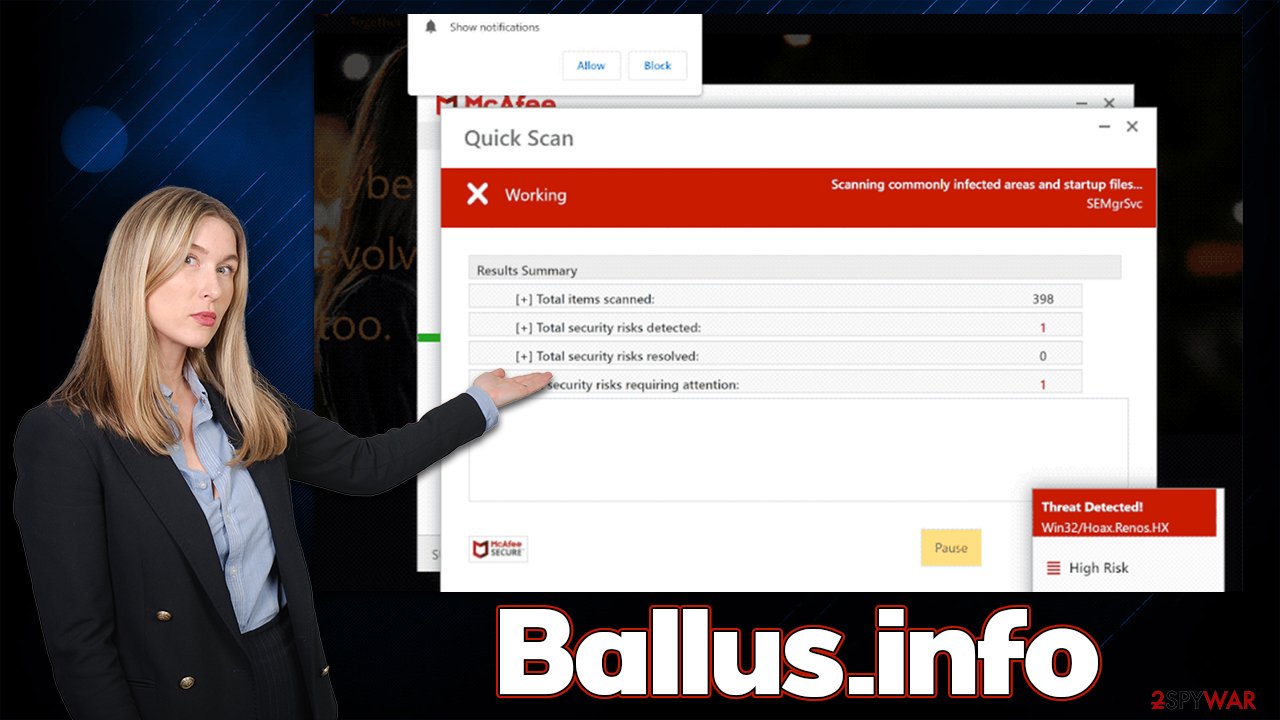Ballus.info ads (Free Instructions)
Ballus.info ads Removal Guide
What is Ballus.info ads?
Ballus.info asks users to download potentially malicious software

Ballus.info is a malicious website that attempts to trick users by showing misleading statements about their computer health. The main goal of scammers behind it is to make sure users click on misleading links and download potentially unwanted or malicious software.
Crooks behind the Ballus.info scam often imitate a virus scan by a legitimate security software provider, such as McAfee or Norton. Once the fake scan is finished, users are shown results that propose that the system has been infected with multiple viruses and needs to be cleaned with the suggested software. Please do not interact with these links, or you might install a fake version of security software, compromising your system security and integrity.
Users do not encounter this website intentionally but are rather redirected to it – it usually happens when they click a malicious link somewhere else. Alternatively, adware infection could be one of the primary causes of the encounters of phishing, scam, spoofing,[1] malware-laden, and commercial content-filled websites.
Below we provide full instructions on how to deal with Ballus.info ads, redirects, and other issues. We also explain how to find and remove adware[2] or other malware that could be causing unwanted browser redirects.
| Name | Ballus.info |
|---|---|
| Type | Scam, adware, redirect |
| Distribution | Software bundles, malicious redirects, ads |
| Scam content | Claims that the subscription for security software has expired and that it needs to be renewed immediately. Asks to download malicious software and enable push notifications |
| removal | You should not interact with the contents shown by a scam website and instead, check your system for adware or malware infections with SpyHunter 5Combo Cleaner security software |
| tips | After the removal of PUPs and malware, we recommend scanning the system with FortectIntego to clean browser caches and fix virus damage automatically |
How do you end up on malicious websites?
Software cracks, torrents, illegal video streaming, and similar websites offer users to get free content that wouldn't be acquired from legitimate sources. There are many reasons why users would visit such websites – the content might not be available in their region, or they might simply not have enough money to purchase the wanted app or a video.
However, it is important to note that these websites are illegal to use and pose plenty of dangers for those who decide to visit them. Software cracks, for example, are one of the primary methods to spread ransomware and other dangerous malware. Likewise, ad space might be rented to cybercriminals who would insert malicious scripts[3] into them.
If you choose to visit such sites, you should not be surprised if you get redirected to Ballus.info or similar websites. Please refrain from visiting high-risk sites deliberately for your own safety. To protect yourself from hacked websites, use powerful anti-malware software and a reputable ad-blocker.
Scam techniques used
Websites that imitate scans from McAfee or Norton security vendors have been on the rise. Just recently we described Mydefensivesoft.com, Totaldatasecuritycentr.com, and Silvergrow.xyz – identical websites that operate in the exact same manner, mimicking reputable security tools. However, it is evident that these scams have nothing to do with original software providers, and the scheme is created by malicious unrelated parties.

Upon entering the Ballus.info site accidentally, users are presented with what seems like an ongoing scan that lasts for a few seconds. Soon after that, they would be hit with the following message they did not expect:
Your PC is infected with 5 viruses!
ACTION REQUIRED
Your McAfee Subscription Has Expired!
Renew now to keep your PC protected.
If your PC is unprotected, it is at risk for viruses and other malware.
This might mislead many people, as fear is a strong feeling many social engineering schemes tend to abuse. Please be aware that no website can identify whether or not your system is infected (unless malware is already installed on your system), so all the claims that your computer has viruses are fake, even if it seems like that message is coming from a legitimate source such as McAfee. Keep in mind that all the logos and other attributes can be easily faked.
Removal of unwanted ads and redirects
First of all, we would like to recommend running a scan with SpyHunter 5Combo Cleaner, Malwarebytes, or another powerful anti-malware software. Redirects to suspicious websites could be one of the symptoms of adware/malware infections, so we recommend ensuring this is not the case. If malicious software is found, it can be easily removed by legitimate security software.
Later, you should clean your browsers from cookies and other web data to stop third parties from tracking your online activities – you can either use FortectIntego maintenance and repair utility or follow the instructions we provide below. This app can also be used to fix virus damage, which would get rid of errors, crashes, and similar post-infection issues.
Google Chrome
- Click the Menu and pick Settings.
- Under Privacy and security, select Clear browsing data.
- Select Browsing history, Cookies and other site data, as well as Cached images and files.
- Click Clear data.

Mozilla Firefox
- Click Menu and pick Options.
- Go to Privacy & Security section.
- Scroll down to locate Cookies and Site Data.
- Click on Clear Data…
- Select Cookies and Site Data, as well as Cached Web Content and press Clear.

MS Edge (Chromium)
- Click on Menu and go to Settings.
- Select Privacy and services.
- Under Clear browsing data, pick Choose what to clear.
- Under Time range, pick All time.
- Select Clear now.

Safari
- Click Safari > Clear History…
- From the drop-down menu under Clear, pick all history.
- Confirm with Clear History.

Suffering from Ballus.info ads? You might have subscribed for push notifications by accident
If you have already scanned your system with security software, you can be sure that your system is not infected with dangerous malware. However, you keep seeing pop-ups on your screen that show up regardless of which websites you are currently visiting, it is likely that you have accepted push notifications from the scam website.
Push notifications are a feature that is present on every modern web browser. If used by malicious parties, it can cause annoying ads that would show even more scams and phishing material. Please do not interact with these pop-ups and instead, use the below instructions to prevent them from being shown in the first place.
Google Chrome
- Open Google Chrome browser and go to Menu > Settings.
- Scroll down and click on Advanced.
- Locate the Privacy and security section and pick Site Settings > Notifications.
- Look at the Allow section and look for a suspicious URL.
- Click the three vertical dots next to it and pick Block. This should remove unwanted notifications from Google Chrome.

Mozilla Firefox
- Open Mozilla Firefox and go to Menu > Options.
- Click on Privacy & Security section.
- Under Permissions, you should be able to see Notifications. Click the Settings button next to it.
- In the Settings – Notification Permissions window, click on the drop-down menu by the URL in question.
- Select Block and then click on Save Changes. This should remove unwanted notifications from Mozilla Firefox.

MS Edge (Chromium):
- Open Microsoft Edge, and go to Settings.
- Select Site permissions.
- Go to Notifications on the right.
- Under Allow, you will find the unwanted entry.
- Click on More actions and select Block.

Safari:
- Click on Safari > Preferences…
- Go to the Websites tab and, under General, select Notifications.
- Select the web address in question, click the drop-down menu and select Deny.

Note: within the settings, you can enable the “Use quieter notifications” option, which would make the annoying notification prompt much less intrusive overall. You can still view it by clicking a small prompt button on the left side of the address bar and then accepting notifications from the website. Choosing “Don't allow sites to send notifications” would stop showing them completely on all websites.
How to prevent from getting adware
Protect your privacy – employ a VPN
There are several ways how to make your online time more private – you can access an incognito tab. However, there is no secret that even in this mode, you are tracked for advertising purposes. There is a way to add an extra layer of protection and create a completely anonymous web browsing practice with the help of Private Internet Access VPN. This software reroutes traffic through different servers, thus leaving your IP address and geolocation in disguise. Besides, it is based on a strict no-log policy, meaning that no data will be recorded, leaked, and available for both first and third parties. The combination of a secure web browser and Private Internet Access VPN will let you browse the Internet without a feeling of being spied or targeted by criminals.
No backups? No problem. Use a data recovery tool
If you wonder how data loss can occur, you should not look any further for answers – human errors, malware attacks, hardware failures, power cuts, natural disasters, or even simple negligence. In some cases, lost files are extremely important, and many straight out panic when such an unfortunate course of events happen. Due to this, you should always ensure that you prepare proper data backups on a regular basis.
If you were caught by surprise and did not have any backups to restore your files from, not everything is lost. Data Recovery Pro is one of the leading file recovery solutions you can find on the market – it is likely to restore even lost emails or data located on an external device.
- ^ Website spoofing. Trend Micro. Definition.
- ^ Adware. Wikipedia. The free encyclopedia.
- ^ Malicious Script. Source Defense. Data breach protection.
